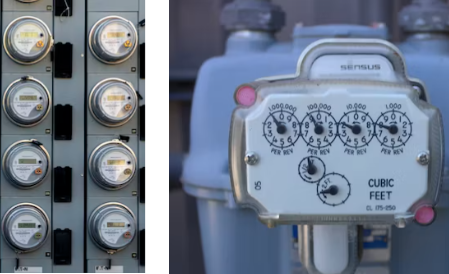Gas or Electric: Which is the Best for Heating and Cooking?

With the ongoing cost of living crisis, many households are carefully considering pricing, especially when it comes to any new installations. Whether you’re considering a new heating system or cooker (or even both), you’ve come to the right place. Let’s look at some facts that will help you decide whether gas or electric is best for you.
Heating Systems
We’ll start by comparing gas and electric heating systems, looking at their features, costs and pros & cons.
Gas
Simply based on fuel cost alone, gas is cheaper than electricity. Per the Energy Price Guarantee (due to expire in Spring 2024), gas costs about £0.10 per kWh (this applied to natural gas, although LPG is a little more expensive), whereas electricity is priced at £0.34 per kWh.
Pros
Natural gas central heating is by far the most common heating system in the UK (utilised by approximately 85% of UK households). Along with being relatively affordable, there is a wide range of gas boilers on the market from established brands like Worcester Bosch, Viessmann and Ideal Heating.
As you’d imagine, there are more options on the market if you opt for a natural gas boiler. However, there are some downsides too.
Cons
On the other hand, while certainly unlikely, gas-related hazards pose a greater risk to health and safety than you’d expect from, say, an electric boiler or electricity-powered heat pump.
Along with the risk of carbon monoxide poisoning (necessitating that you should have carbon monoxide alarms installed throughout your home – and test them regularly), there is also a small risk of a gas leak which can even result in explosions. These are just some of the reasons why it’s important to have a gas boiler serviced annually. On average, a gas safety certificate & servicing cost will come to about £90 to £250 in total between the two.
Electric
As mentioned, currently, electricity is priced at £0.34 per kWh. While this makes electric boilers more expensive than gas boilers, the efficiency of heat pumps can sometimes make them more affordable to run.
Pros
While electricity is more expensive (when taken from the grid), it can be a more eco-friendly solution, so long as you source the energy from a green energy provider.
Moreover, if you have an electric boiler installed, you could power it largely or even entirely with free electricity generated via solar panels. While you’d be looking at a higher installation cost, you could benefit from minimal or even eliminated heating bills!
Then there is the option of electric-powered heat pumps. While electricity is more expensive than gas, heat pumps can harness energy from the surrounding environment thus, they can generally offer efficiency levels of 300-400%! In other words, they can generally produce 3x or 4x as much energy as is needed to power them, which can often cancel out the cost difference between electricity and gas.
Electric boilers and heat pumps tend to require less maintenance than gas boilers too. Moreover, heat pumps can last for 20+ years, whereas boilers tend to need replacing after 10-15 years.
Cons
If you cannot power your electric boiler with on-site renewable tech, then it will cost substantially more to run than a gas boiler. In that scenario, it may only make sense if you live off the gas grid, although oil and LPG boilers might also be viable options in that case.
Moreover, if you’re considering a heat pump, the cost will be a major concern as they tend to come with a hefty total installation cost of anywhere from £8,000 to £45,000. It is possible (for those based in England and Wales) to have the price slashed by £5,000 to £6,000, but it’s going to cost a lot either way. Also, with a heat pump installed, you’ll likely need larger radiators or underfloor heating added to your home.
Cooking
Now let’s compare gas cookers and electric cookers, seeing how they compare in terms of features, pros and cons and costs.
Gas
Again, as mentioned, gas currently costs £0.10 per kWh on average, making it the more affordable option for cooking.
Pros
Among the key benefits of gas cooking is that simmering and boiling with a gas hob is generally easier and faster than with an electric one. Ultimately, with more responsive temperature changes, gas cooking gives you more control.
Cons
As with gas boilers, gas cookers are somewhat of a greater safety hazard than electric boilers. And just like a gas boiler, you should have your gas cooker serviced once a year. This is not a con per se but worth mentioning in the context of safety concerns.
Electric
While electricity costs about £0.34 per kWh at the moment, it is more efficient for heating up (more on that shortly).
Pros
Electric heats in a more efficient manner, and if you go with a cooker featuring a ceramic hob or even an induction cooker, these options can significantly lower residual heat loss when cooking with the electric hob. Electric stovetops also tend to be smoother, making them relatively easy to clean.
Cons
As mentioned, an electric cooker is likely to cost more to run over time, resulting in heftier bills. However, it may be worth the price, depending on your preferences.

